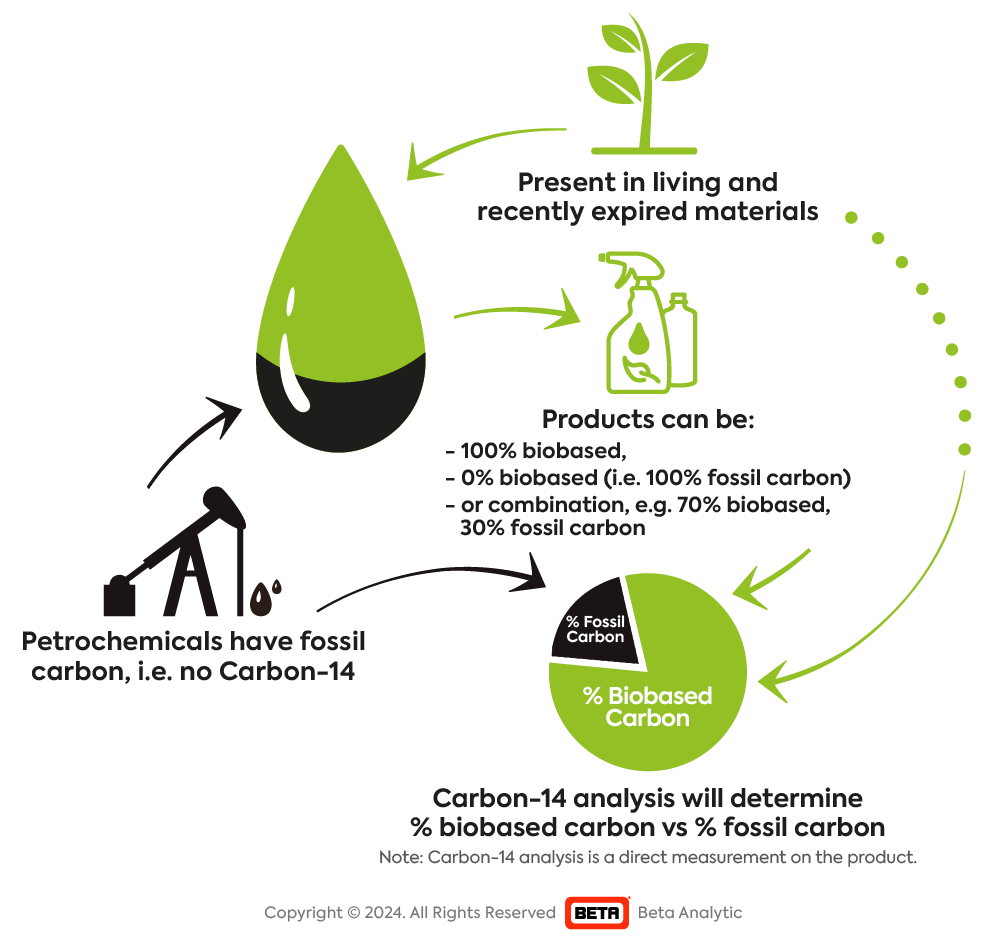
Materials derived from renewable carbon sources are becoming increasingly favored in multiple industries as companies transition from fossil-derived materials to biomass. Growth within the biobased product market is expected to grow from approximately USD 11,000 million in 2017 to USD 94,150 million by the end of 2026.1 The development of more sustainable biobased products brings to attention the need for third-party verification of an end-product’s biobased content to validate biobased content and to support marketing claims. In addition, verification of biobased content is often required for eco-labeling applications and certifications. Carbon-14 testing is an analytical solution to these challenges and goals.
Biobased testing utilizes carbon-14 measurement via Accelerator Mass Spectrometry (AMS) based on standards such as ASTM D6866, ISO 16620, and EN 16640. Materials sourced from biomass contain a known level of the weakly radioactive isotope, carbon-14. After the death of these materials they no longer exchange this isotope with the biosphere. Thus, the level of carbon-14 decreases through radioactive decay.2 Fossil-derived materials that have completed the process of radioactive decay of their carbon-14 content do not have any carbon-14.
Based on these scientific principles, the use of carbon-14 testing to measure the percentage of biobased content as opposed to fossil-sourced alternatives is highly accurate. Analysis measures the amount of an ingredient, component, or finished product that is formulated from biomass, or biobased, materials as opposed to petrochemical sources. Results indicate the ratio of biobased material versus petrochemical material in a given sample. For example, a sample resulting in 100% biobased content has been completely made from biomass-derived materials whereas a result of 0% indicates the material comes from fossil-sources. A percentage in between indicates a mixture of biomass and fossil-sourced material.
Beyond ensuring product content transparency and supporting marketing claims, biobased testing also allows companies to apply for certifications. Several programs require biobased testing to apply for labeling and certification including Din Certco’s DIN-Geprüft Biobased certification scheme, TÜV AUSTRIA’s OK Biobased program, and the United States Department of Agriculture (USDA) BioPreferred® Program.
In conclusion, as consumers increasingly demand eco-friendly products, companies will continue to seek verification of their biobased content. Carbon-14 testing is highly applicable for validating biobased content and provides manufacturers and distributors accurate data to prove their content claims. Testing also provides results needed to apply for biobased certifications to enhance consumer confidence.
1 Zion Market Research. Global Bio-Based Materials Market Will Reach USD 94,150.0 Million By 2026: Zion Market Research. [Internet]. New York: Zion Market Research. 2018 Aug.
2 ASTM International. ASTM D6866 – 18, Standard Test Methods for Determining the Biobased Content of Solid, Liquid, and Gaseous Samples Using Radiocarbon Analysis. [Internet]. Pennsylvania: ASTM International. 2018.
Author
Jordan Turner (Beta Analytic)
Source
Jordan Turner, original text, 2024-04.
Supplier
BETA Analytic, Inc.
BioPreferred
DIN CERTCO Gesellschaft für Konformitätsbewertung
TÜV AUSTRIA Group
Share
Renewable Carbon News – Daily Newsletter
Subscribe to our daily email newsletter – the world's leading newsletter on renewable materials and chemicals












